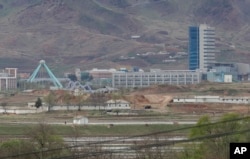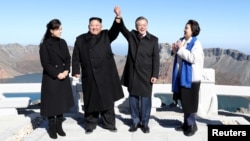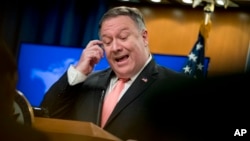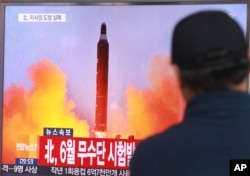The United States and South Korea have agreed to launch a joint working group to coordinate their North Korea sanctions, a move that reflects Washington’s attempt to bridge the allies’ diverging approaches to denuclearizing the Kim regime, experts said.
“The two governments agreed on establishing a new working group that would further strengthen our close coordination on our diplomacy, on our denuclearization efforts, on sanctions implementations, and inter-Korean cooperation that comply with the United Nations sanctions,” Robert Palladino, the State Department’s deputy spokesperson, said.
“So this is an additional step that we’re taking that Special Representative (Stephen) Biegun and his team will be leading,” Palladino said.
The announcement Tuesday came hours after Biegun returned from Seoul, where he discussed “diplomatic efforts to achieve the final, fully verified denuclearization of North Korea,” Palladino added.
The agreement for a joint working group comes as the denuclearization efforts of Washington and Seoul are increasingly at cross-purposes.
Sanctions pressure
Washington has been keeping sanctions pressure on North Korea as it engages in diplomacy, while Seoul has been prioritizing improving inter-Korean ties through joint economic activities that could violate sanctions, which concerns Washington.
“Obviously, coordination has been a problem this year,” said Douglas Paal, vice president for studies at the Carnegie Endowment for International Peace. “The working group reflects concern in the U.S. that [Seoul] is getting too far out in front. … I hope this provides a systematic way to manage differences.”
Robert Manning, a senior fellow at the Atlantic Council, welcomed the formation of the new working group that he expects would keep inter-Korean activities in balance with the objective of denuclearization.
“I commend the administration on this much-needed initiative,” Manning said. “There have been two separate tracks of diplomacy toward North Korea: North-South reconciliation and cooperation, and U.S.-North Korea denuclearization talks. So this working group is aimed at keeping both sets of negotiations closely linked so that the North-South efforts do not get too far ahead of denuclearization efforts.”
Scott Synder, director of the Program on U.S. Korea Policy at the Council on Foreign Relations, points out that the need for a working group has been “apparent since the Pyongyang summit.”
After signing military agreements aimed at reducing tensions and agreeing to pursue inter-Korean economic projects at the Pyongyang summit in September, Seoul and Pyongyang heightened their calls for sanctions relief.
Synder said Seoul’s “overtures and relaxation of tensions with North Korea should be accompanied by clear communication and effective coordination as related to sanctions.”
Manning criticized South Korean President Moon Jae-in’s initiative in advancing inter-Korean economic ties that counter international sanctions.
“President Moon has begun to bump up against the limits of North-South cooperation that are inconsistent with U.N. Security Council sanctions,” Manning said.
‘There will be limits’
“There will be limits to what the consultative group can achieve,”said Troy Stangarone, senior director of the Korea Economic Institute, unless Washington and Seoul have “a common approach to North Korea that entails an agreed [upon] set of objectives.”
According to Joshua Stanton, a Washington-based attorney who helped draft the North Korea Sanctions Enforcement Act in 2016, getting “back on the same page” will require Washington and Seoul to “come to a common understanding of sanctions.”
“It’s very clear to me that the two governments are pursuing policies that are not only poorly coordinated, but they are directly conflicting with each other,” Stanton said.
William Newcomb, a former U.S. Treasury official who was on the U.N. Security Council’s Panel of Experts on North Korea, said Washington should clarify “the applicability of U.S. sanctions” to Seoul through the working group and advise it to “deflect too-hasty impulses to seek sanctions relief for North Korea.” He added, “At this stage, [it is] impossible to tell if it will be a consequential player or not.”
While keeping the dialogue open and engaging with Pyongyang, Washington has been calling for Seoul to maintain pressure on North Korea.
During a radio interview Wednesday, U.S. Secretary of State Mike Pompeo said, “I’ll speak with my counterpart next week.”
“And then we do have the intention of President [Donald] Trump and Chairman Kim [Jong Un] getting together before too long, hopefully early in the next year,” he said.
On Thursday, on another radio show, Pompeo said, “President Trump’s been clear. The economic sanctions will not be lifted until such time as we have had the capacity to verify that they have eliminated their nuclear program.”
Stanton said South Korea has been undermining the U.S. policy of maintaining sanction pressures on Pyongyang as it seeks economic development with the North.
“The whole point of U.S. policy is that North Korea has to choose between economic development and nuclear weapons,” Stanton said. “North Korea has the Byongjin policy, which is that we can have both.”
Pyongyang’s Byongjin policy, set forth in 2016 by North Korean leader Kim, aims to develop nuclear weapons and the economy simultaneously.
Stanton continued, “The South Koreans seem to be taking the North Korean side here by saying, We’re going to give you economic development … while we pretend to demand that you denuclearize.’…And what South Korea is essentially doing is undermining that pressure and, therefore, undermining the U.S. policy.”
In September, the U.S. Treasury Department made calls to seven South Korean banks, raising concerns about their plans to open branches in North Korea.
According to South Korea’s Financial Services Commission, the Treasury Department said it was “deeply concerned” about Seoul’s possible financial cooperation with the North during the call.
Financial dealings
The Treasury’s calls triggered widespread speculation that the U.S. might consider taking action because of South Korea’s possible financial dealings with North Korea. South Korean banks have been preparing to take advantage of financial opportunities in Pyongyang since inter-Korean relations began thawing earlier this year.
The Treasury Department, however, said its direct calls to South Korean banks were “routine interactions” that should not be taken as a signal for a future sanctions action, in an email message sent to VOA’s Korean Service this week.
“While we do not speculate on possible sanctions violations or comment on prospective actions, routine interactions should not be misinterpreted as telegraphing a future sanctions action,” a Treasury spokesperson said in the email.
Newcomb said, “Treasury was acting prudently to forestall having to take formal action against the [South Korean] banks should they have proceeded with plans to connect with [North Korea] in violation of sanctions. … Should any [South Korean] banks nonetheless open a branch in [North Korea], it would be in flagrant violation of U.N. sanctions.”
Stanton said the consequence of violating sanctions regulations include steep civil penalties and “the loss of access to corresponding banks in the United States.” The latter, he said, would “destroy a bank or turn the bank into a small neighborhood bank instead of an international bank.”
U.N. sanctions prohibit creating ventures in North Korea, including financial institutions, and helping Pyongyang gain access to the international financial system.
The Treasury Department’s Financial Crimes Enforcement Network (FinCEN) issued an advisory Wednesday, calling for financial institutions to heighten compliance with U.N. and U.S. sanctions on North Korea. The sanctions ban them from engaging in all transactions involving North Korea.
William Brown, a former U.S. intelligence official and a professor of North Korean economy at Georgetown University, said establishing a capitalistic banking system in North Korea first requires economic reform.
“Even if the nuclear issue is resolved and sanctions were removed, the fact remains North Korea’s still highly socialist system can’t deal with normal finances,” Brown said. “There are still tremendous obstacles before any kind of branch bank can be established in North Korea.”
Moon said Thursday that Kim will visit Seoul “soon.” Kim’s visit to South Korea will be the first by a North Korean leader.
Also Thursday, a no fly-zone and ban on military drills near the demilitarized zone went into effect as agreed at the September inter-Korean summit.
Washington and Seoul are considering whether to conduct joint military exercises next year, and the decision will be made by December.
Paul Park contributed to this report, which originated with the VOA Korean Service.








